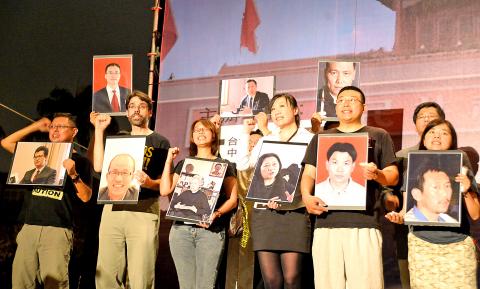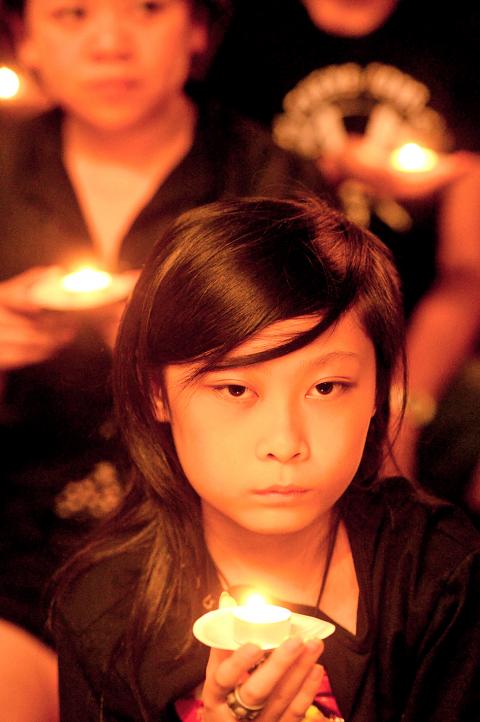Holding up portraits of detained Chinese democracy activists and lighting candles, hundreds of people gathered in Liberty Square in Taipei — where thousands had rallied in support of students and others protesting in Beijing’s Tiananmen Square 25 years ago — to mark the 25th anniversary of the Tiananmen Square Massacre.
“Free prisoners of conscience! Let human rights reign,” the participants chanted, while holding small candles in their hands to show their support for democracy in China as they remembered the tragedy in 1989.
“I would like to thank Taiwanese for standing on the same side as Chinese democracy activists,” exiled Chinese dissident Wuer Kaixi, one of the Tiananmen student leaders, told the rally. “We have not succeeded in our quest for democracy, and I would like to urge all Taiwanese to continue standing with us.”

Photo: Wang Yi-sung, Taipei Times
It is unimaginable that the dictatorship of the Chinese Communist Party still stands, he said.
“I sometimes lament the fact that, since the Chinese students fired the first shot in 1989, we have not been able to succeed in 25 years,” the Uighur activist said.
However, Wuer Kaixi said he has never lost hope, because over the course of the past century, several fascist and communist regimes elsewhere in the world have fallen.

Photo: Wang Yi-sung, Taipei Times
During the recent Sunflower movement protests in Taiwan, “some may have been surprised to realize how easily freedom could be lost, even when we are a strait away” from China, he said, urging the crowd to stand in line with Chinese democracy activists in the fight against dictatorship.
Long-time human rights advocate and attorney Wellington Koo (顧立雄) made a similar appeal.
“Having been through what we have been through together, we may feel that what happened in Tiananmen Square 25 years ago is no longer so distant,” Koo said.
“Remembering Tiananmen is not only about remembering what happened there 25 years ago, or those Chinese student activists on the square, it is also about showing our insistence on maintaining our way of life and our democracy,” he said.
“Let’s all join the campaign together, to make sure our way of life would stay on forever,” Koo added.
Exiled Chinese dissident writer Yu Jie (余杰) said the Tiananmen Square Massacre had been a wake-up call for him, leading him to the realization that he should lead a life to uphold certain values when, as a 16-year-old sitting in his home in a small town in China’s Sichuan Province, he heard gunshots over the radio from far away in Beijing.
“Eight years ago, I was in China, my friends and I — a total of six people — gathered to remember the massacre,” he said. “I could never imagine that, eight years later, I would be in Taipei, remembering the tragedy with hundreds of people.”
To help Taiwanese better understand the meaning of Tiananmen Square Massacre, “I would call it China’s 228 Massacre,” he said.
Later in the rally, people remembered the tragedy by singing, reciting poetry and saying prayers in the hope that democracy and freedom would reign over China soon.

Taiwan is projected to lose a working-age population of about 6.67 million people in two waves of retirement in the coming years, as the nation confronts accelerating demographic decline and a shortage of younger workers to take their place, the Ministry of the Interior said. Taiwan experienced its largest baby boom between 1958 and 1966, when the population grew by 3.78 million, followed by a second surge of 2.89 million between 1976 and 1982, ministry data showed. In 2023, the first of those baby boom generations — those born in the late 1950s and early 1960s — began to enter retirement, triggering

ECONOMIC BOOST: Should the more than 23 million people eligible for the NT$10,000 handouts spend them the same way as in 2023, GDP could rise 0.5 percent, an official said Universal cash handouts of NT$10,000 (US$330) are to be disbursed late next month at the earliest — including to permanent residents and foreign residents married to Taiwanese — pending legislative approval, the Ministry of Finance said yesterday. The Executive Yuan yesterday approved the Special Act for Strengthening Economic, Social and National Security Resilience in Response to International Circumstances (因應國際情勢強化經濟社會及民生國安韌性特別條例). The NT$550 billion special budget includes NT$236 billion for the cash handouts, plus an additional NT$20 billion set aside as reserve funds, expected to be used to support industries. Handouts might begin one month after the bill is promulgated and would be completed within

The National Development Council (NDC) yesterday unveiled details of new regulations that ease restrictions on foreigners working or living in Taiwan, as part of a bid to attract skilled workers from abroad. The regulations, which could go into effect in the first quarter of next year, stem from amendments to the Act for the Recruitment and Employment of Foreign Professionals (外國專業人才延攬及僱用法) passed by lawmakers on Aug. 29. Students categorized as “overseas compatriots” would be allowed to stay and work in Taiwan in the two years after their graduation without obtaining additional permits, doing away with the evaluation process that is currently required,

IMPORTANT BACKER: China seeks to expel US influence from the Indo-Pacific region and supplant Washington as the global leader, MAC Minister Chiu Chui-cheng said China is preparing for war to seize Taiwan, Mainland Affairs Council (MAC) Minister Chiu Chui-cheng (邱垂正) said in Washington on Friday, warning that Taiwan’s fall would trigger a regional “domino effect” endangering US security. In a speech titled “Maintaining the Peaceful and Stable Status Quo Across the Taiwan Strait is in Line with the Shared Interests of Taiwan and the United States,” Chiu said Taiwan’s strategic importance is “closely tied” to US interests. Geopolitically, Taiwan sits in a “core position” in the first island chain — an arc stretching from Japan, through Taiwan and the Philippines, to Borneo, which is shared by